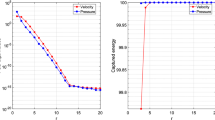Abstract
The proper orthogonal decomposition (POD) is a model reduction technique for the simulation of physical processes governed by partial differential equations (e.g., fluid flows). It has been successfully used in the reduced-order modeling of complex systems. In this paper, the applications of the POD method are extended, i.e., the POD method is applied to a classical finite difference (FD) scheme for the non-stationary Stokes equation with a real practical applied background. A reduced FD scheme is established with lower dimensions and sufficiently high accuracy, and the error estimates are provided between the reduced and the classical FD solutions. Some numerical examples illustrate that the numerical results are consistent with theoretical conclusions. Moreover, it is shown that the reduced FD scheme based on the POD method is feasible and efficient in solving the FD scheme for the non-stationary Stokes equation.
Similar content being viewed by others
References
Brezzi, F. and Douglas, Jr. J. Stabilized mixed method for the Stokes problem. Numer. Math., 53(1–2), 225–235 (1988)
Douglas, Jr. J. and Wang, J. P. An absolutely stabilized finite element method for the Stokes problem. Math. Comp., 52, 495–508 (1989)
Chung, T. Computational Fluid Dynamics, Cambridge University Press, Cambridge (2002)
Holmes, P., Lumley, J. L., and Berkooz, G. Turbulence, Coherent Structures, Dynamical Systems and Symmetry, Cambridge University Press, Cambridge, UK (1996)
Fukunaga, K. Introduction to Statistical Pattern Recognition, Academic Press, Boston (1990)
Jolliffe, I. T. Principal Component Analysis, Springer-Verlag, Berlin (2002)
Crommelin, D. T. and Majda, A. J. Strategies for model reduction: comparing different optimal bases. J. Atmos. Sci., 61, 2306–2317 (2004)
Majda, A. J., Timofeyev, I., and Vanden-Eijnden, E. Systematic strategies for stochastic mode reduction in climate. J. Atmos. Sci., 60, 1705–1723 (2003)
Selten, F. Baroclinic empirical orthogonal functions as basis functions in an atmospheric model. J. Atmos. Sci., 54, 2100–2114 (1997)
Lumley, J. L. Coherent Structures in Turbulence, In Transition and Turbulence (ed. Meyer, R. E.), Academic Press, New York, 215–242 (1981)
Aubry, Y. N., Holmes, P., Lumley, J. L., and Stone, E. The dynamics of coherent structures in the wall region of a turbulent boundary layer. J. Fluid Mech., 192, 115–173 (1988)
Sirovich, L. Turbulence and the dynamics of coherent structures: part I–III. Quart. Appl. Math., 45(3), 561–590 (1987)
Joslin, R. D., Gunzburger, M. D., Nicolaides, R., Erlebacher, G., and Hussaini, M. Y. A self-contained automated methodology for optimal flow control validated for transition delay. AIAA Journal, 35, 816–824 (1997)
Ly, H. V. and Tran, H. T. Proper orthogonal decomposition for flow calculations and optimal control in a horizontal CVD reactor. Quart. Appl. Math., 60, 631–656 (2002)
Moin, P. and Moser, R. D. Characteristic-eddy decomposition of turbulence in channel. J. Fluid Mech., 200, 471–509 (1989)
Rajaee, M., Karlsson, S. K. F., and Sirovich, L. Low dimensional description of free shear flow coherent structures and their dynamical behavior. J. Fluid Mech., 258, 1–29 (1994)
Kunisch, K. and Volkwein, S. Galerkin proper orthogonal decomposition methods for parabolic problems. Numer. Math., 90, 117–148 (2001)
Kunisch, K. and Volkwein, S. Galerkin proper orthogonal decomposition methods for a general equation in fluid dynamics. SIAM J. Numer. Anal., 40, 492–515 (2002)
Kunisch, K. and Volkwein, S. Control of Burgers’ equation by a reduced order approach using proper orthogonal decomposition. J. Optim. Theory Appl., 102, 345–371 (1999)
Ahlman, D., Södelund, F., Jackson, J., Kurdila, A., and Shyy, W. Proper orthogonal decomposition for time-dependent lid-driven cavity flows. Numer. Heat Transfer Part B, 42(4), 285–306 (2002)
Luo, Z. D., Wang, R. W., Zhu, J. Finite difference scheme based on proper orthogonal decomposition for the non-stationary Navier-Stokes equations. Sci. China Ser. A: Math., 50(8), 1186–1196 (2007)
Luo, Z. D., Chen, J., Zhu, J., Wang, R. W., and Navon, I. M. An optimizing reduced order FDS for the tropical pacific ocean reduced gravity model. Int. J. Numer. Methods Fluids, 55, 143–161 (2007)
Luo, Z. D., Chen, J., Navon, I. M., and Yang, X. Z. Mixed finite element formulation and error estimates based on proper orthogonal decomposition for the non-stationary Navier-Stokes equations. SIAM J. Numer. Anal., 47(1), 1–19 (2008)
Luo, Z. D., Chen, J., Sun, P., and Yang, X. Z. Finite element formulation based on proper orthogonal decomposition for parabolic equations. Sci. China Ser. A: Math., 52(3), 585–596 (2009)
Sun, P., Luo, Z. D., and Zhou, Y. J. Some reduced finite difference schemes based on a proper orthogonal decomposition technique for parabolic equations. Appl. Numer. Math., 60, 154–164 (2010)
Volkwein, S. Optimal control of a phase-field model using the proper orthogonal decomposition. ZFA Math. Mech., 81, 83–97 (2001)
Antoulas, A. Approximation of large-scale dynamical systems. Soc. Indust. Appl. Math., 10, 12–60 (2005)
Stewart, G. W. Introduction to Matrix Computations, Academic Press, New York (1973)
Noble, B. Applied Linear Algebra, Prentice-Hall, New Jersey (1969)
Girault, V. and Raviart, P. A. Finite Element Approximations of the Navier-Stokes Equations, Theorem and Algorithms, Springer-Verlag, New York (1986)
Author information
Authors and Affiliations
Corresponding author
Additional information
Project supported by the National Natural Science Foundation of China (Nos. 10871022, 11061009, and 40821092), the National Basic Research Program of China (973 Program) (Nos. 2010CB428403, 2009CB421407, and 2010CB951001), and the Natural Science Foundation of Hebei Province of China (No.A2010001663)
Rights and permissions
About this article
Cite this article
Luo, Zd., Ou, Ql. & Xie, Zh. Reduced finite difference scheme and error estimates based on POD method for non-stationary Stokes equation. Appl. Math. Mech.-Engl. Ed. 32, 847–858 (2011). https://doi.org/10.1007/s10483-011-1464-9
Received:
Revised:
Published:
Issue Date:
DOI: https://doi.org/10.1007/s10483-011-1464-9




